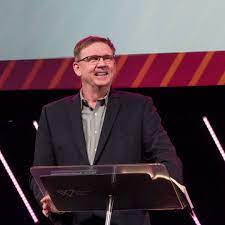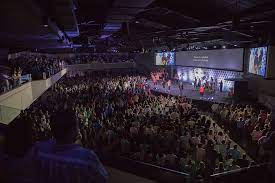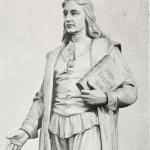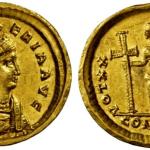Hi! I am a cultural sociologist on a tour of Texas Megachurches. Check out my first post here!
______________________________________________________________________________________
Now that we know that Trump will be the Republican nominee, the salience of Christian Nationalism in voting patterns will again become, I think, top concern for people invested in the well-being of our democracy.
Ryan Burge asserts that Christian Nationalism is fading in the general population, citing comparisons between two excellent datasets from 2007 and 2021. Burge bases his accounts on (what he calls) “the empirical foundations of the Christian Nationalism debate,” which he locates in six statements that were posed to respondents in the Baylor Religion Survey back in 2007 – Wave II, and which were repeated in 2021.
They are as follows:
-
- The federal government should: advocate Christian values; 2. allow prayer in public schools; 3. allow the display of religious symbols in public spaces; 4. declare the United States a Christian nation; 5. enforce strict separation of church and state; and 6. The success of the United States is part of God’s plan.
Across five of six metrics, Burge finds that Christian Nationalist (CN) support has declined in the population from 2007 to 2021. This take is fascinating since, as Burge notes, Christian Nationalism has been the subject of at least seven books published on the subject since 2020. This makes it reasonable to ask: Are we seeing a spike in sociological analyses on Christian Nationalism at a moment its prevalence is waning in the public?
I’ll grant this: it’s likely that Christian Nationalism, like all nationalisms, will wax and wan in the public. But I suspect that Christian Nationalism has a durable presence as a rhetoric–for instance, within church cultures–and that this means that it maintains potential for animating parts of the electorate at key moments. This series began with my recounting a visit to a large Methodist church on their July 4th-celebratory-Sunday. It was a maximally patriotic affair. I imagine that every year, in July, Christian nationalist discourse gets refreshed in pulpits across the country.
As I turn to the 2024 election season, I am considering how such church practices can form part of a continuous expression of nationalism that (while it might go dormant now and again) can still become more influential at key moments in public life: like highly contested elections.
As part of this series, I’ve been visiting megachurches in Texas, looking for Christian Nationalism. I’ve found plenty that nuances and/or challenges the popular account of evangelicalism’s being the fount of White Christian Nationalism. For example, amid the very interracial crowds, platforms, and aesthetics of San Antonio’s megachurches, it is hard to conceive of their being particularly White Christian Nationalist. For another, given that so many megachurches are awash in Jewish symbols and Zionist preaching, it is also hard to assert that attendees would doggedly hold to the US’ having a special, all-important place in salvation history. (John Hagee’s 20k audience will readily identify Israel as having a (much) stronger claim to divine favor.)
Still, I have heard much in the way of Christian Nationalist rhetoric, and today, I would like to give you an example from the vault: from a 2018 sermon by Rev. Dr. Jim Rion, founding pastor of Westover Hills Assembly of God. I am sharing an older video with you, today, which I hope can provide one window into the evangelical imagination about the nation. I don’t think this sermon wholly conforms to popular conceptions about Christian Nationalism, per se– and for this reason, I think it is revealing.
At roughly 6k attendees and about a 22 million dollar operation, Westover Hills is by no means the largest or flashiest megachurch under our consideration. Three others hover closer to 20k attendees and are much larger fiscal operations. But Westover is clearly well over the 2k it requires to be part of the megachurch landscape. In this video, Rev. Dr. Rion– really only ever called Pastor Rion– is featured preaching a July 4th sermon titled, “A NEW BIRTH OF FREEDOM,” again, in 2018. 
Here is a short rundown of what I heard in Rion’s short sermon, with minute notes in case you decide to follow along.
- The video begins with a solemn recitation of Abraham Lincoln’s Gettysburg Address. As Rion reads the Address, in a bit of a southern twang, images flash below the screen that feature Martin Luther King; troops that appear to on the right side of Civil War history; and of present day police forces that are standing forcefully against persons with Nazi symbols. These visual slides are genius. Rion is beginning his story about the nation with visual story telling of its virtuous struggle to end slavery and genocide. Rion places extra emphasis on the final lines of the Address, which read: “…that this nation, under God, shall have new birth of freedom, and that the government of the people, by the people, and for the people shall not perish from the earth.” Overall, Rion’s framing reassigns the birth of the US, effectively, to 1863, amidst a virtuous struggle.
- I observed a surprisingly high degree to which Rion’s vision for the nation and his belief in biblical principles are intertwined. Christians, he says, simply cannot abide by or support anything that is evil; they cannot allow things contrary to the gospel, or that present the world “upside down.” I take this to mean there is not a vision for pluralism in this sermon. Beginning from minute 6:00, Rion asserts: “There are some things that will not mix.” At this point he references “alternative lifestyles”– a holdover term from 90s evangelicalism for LGBTQ+ persons. In Rion’s account, Christians must to be willing to stand up for what is biblically right, no matter how unpopular it may be. It is in this context that Rion calls his audience to “a moment of national conscience again.” The new birth of freedom Rion is advocating for is for the free exercise of Christian conscience in public life.
3. From minute 12:00, Rion gives on a long treatment on the role of conscience in American life. In this sermon, conscience connects the American Christian to God. In minute 15, Rion creates a hierarchy: “It does not matter what everybody says, what the Supreme Court says…we are responsible to God.” There are times in society, and in life, Rion says, that Christians need to say “Enough is enough.. political correctness will not get in the way of my biblical values. The Supreme Court may legalize it, but I will not normalize it. There are things that become legal, but it does not mean it is moral. And our witness for Christ has been muted… We must say, ‘no more!'” What good does it do for me to speak up? Rion asks rhetorically, only to thunder back: It does matter!
This sermon enjoins Christians to exercise their God-connected consciences. It depicts them as having more responsibility and more authority than either popular will or the law/Supreme Court.
4. I heard the most Christian Nationalist assertion of the sermon in Rion’s take on the separation of church and state. Rion rehearses, in detail, a reading of the original intention of said separation as one motivated to protect– not the state–but the church from state interference. This reading Rion ties explicitly to the Free Exercise clause, which stipulates that Congress shall “pass no laws impairing on Americans’ rights to freely exercise their faith.” Please note that Rion makes a very pointed case about the exemption of religion from federal oversight, and this well ahead of the 2019 pandemic.
5. Given the very nationalist bent in Rion’s Christianity, I found most  astonishing how closely Rion then takes a turn and ties (minute 18:00) the virtue of the nation to its impulse for freedom, and how thoroughly he defines this impulse by the struggle for equality faced by Black Americans. After rehearsing the Gettysburg Address, Rion intertwines the 13th amendment, the Civil War, the Civil Rights era and Martin Luther King as the defining pivot points in his narrative about America “finding her soul again and again.” It is Abraham Lincoln’s exercise of conscience against slavery that Rion uses to galvanize his audience to become more public about their values. This, to be clear, is Christian Nationalism– but it is one which champions the liberation of black Americans as (by far) the key index of the Christianity of the nation.
astonishing how closely Rion then takes a turn and ties (minute 18:00) the virtue of the nation to its impulse for freedom, and how thoroughly he defines this impulse by the struggle for equality faced by Black Americans. After rehearsing the Gettysburg Address, Rion intertwines the 13th amendment, the Civil War, the Civil Rights era and Martin Luther King as the defining pivot points in his narrative about America “finding her soul again and again.” It is Abraham Lincoln’s exercise of conscience against slavery that Rion uses to galvanize his audience to become more public about their values. This, to be clear, is Christian Nationalism– but it is one which champions the liberation of black Americans as (by far) the key index of the Christianity of the nation.
6. But then, I was surprised to hear Rion admonishing his congregation not to become careless with their speech; not to be angry or derisive. This type of political engagement, he says, is not in line with Christianity; it makes no sense, he offers, to try to be salt or light to a community by choosing what is right–only then to espouse one’s choices in a spiteful, heavily polarized way. Polarization, Rion offers, is no desirable state for our nation: “Stand up for Christ in a Christlike manner!” He then told his audience that, in taking stands for righteousness, “we need to expect opposition,” but (minute 25) “you have a right as an American citizen to say: that is wrong and I will not participate in it!” This sermon depicts Christians as embattled and oppressed.
7. In minute 28, Rion thanks congregants who are citizens that serve in the military. Thank you, he said, for “providing liberty to all of us.” Rion goes on to thank educators who work in a culture war, who have to buy their own supplies; educators “do their best” but “Spirit-filled parents” need to be more willing to be part of the PTA. First responders and social workers and voters, Rion says, all make America a better place. “Every time you go to the polls and exercise your liberty, you honor American fallen heroes.” Healthcare workers, city governance, bureaucrats, foster parents– every one of these actors comes into Rion’s account for making America a better place. In his closing remarks quoting Lincoln again (minute 40), Rion asks God to pull America (who has wandered and become tainted and wounded) back toward “biblical righteousness, kindness, civility–let us be biblical citizens!” Let us, Rion implores, be one nation under God. This sermon depicts being American as as deeply Christian endeavor.
I cannot see the audience in this 2018 sermon, but I have no doubt that they would have an impression of America’s “soul” and destiny as being particularly Christian a result of this sermon. I also think they would feel oppressed, because at many points Rion suggests Christians have been “muted” and need to publicly defend their right to exercise their consciences. At the same time, I do not hear this sermon as espousing Trump or Trumpism. To wit, Rion prays for both Democrats and Republicans and prays that American hearts would “be drawn together.”
In my next and penultimate entry in this series, I will compare the above 2018 sermon with a sermon from this April– my upcoming visit to Westover. I will be looking for ways the last five years might have shifted Pastor Rion’s rhetoric. At that point too, I will offer a participant observation of a visit to Westover, complete with estimates about its congregational makeup and platformed representations and refreshed assessment for how it may or may not be circulating Christian Nationalism.













